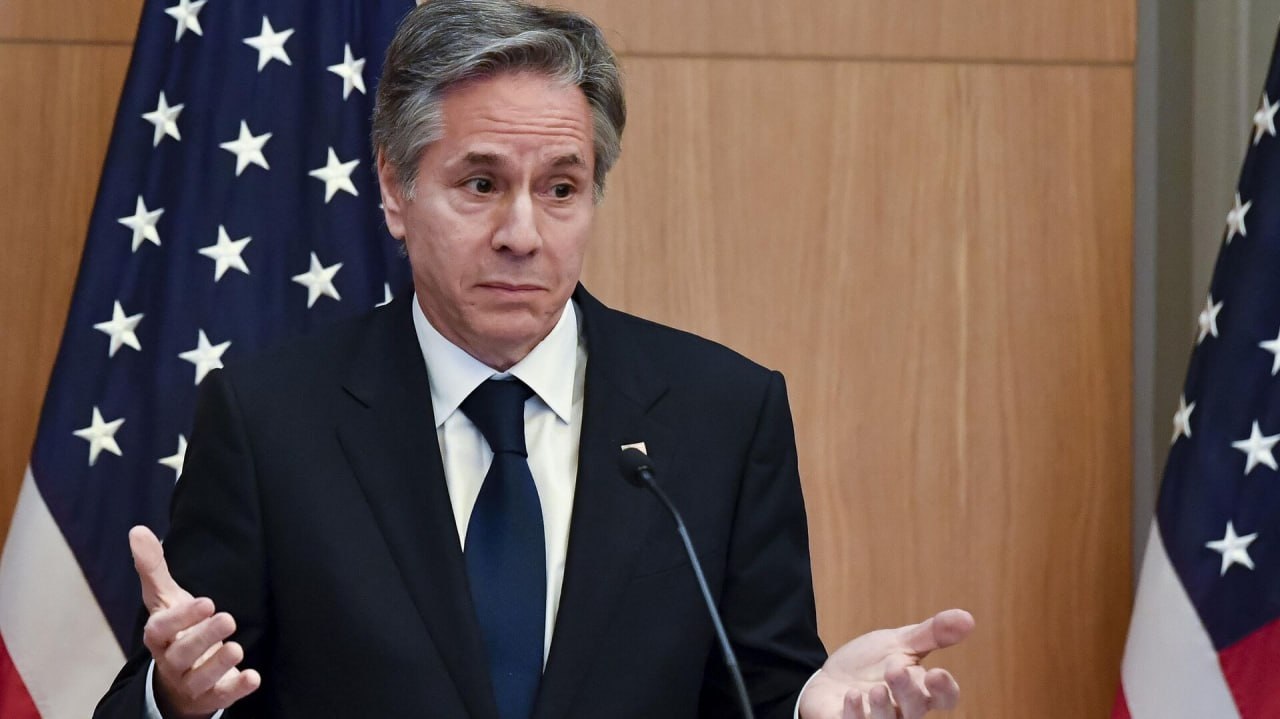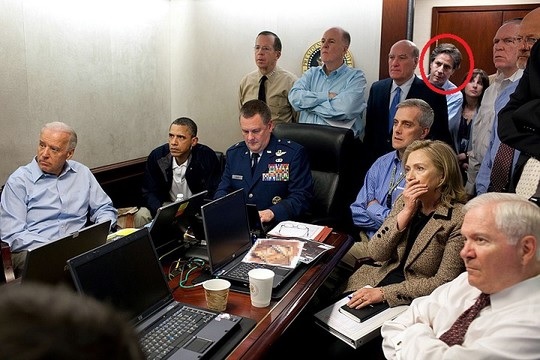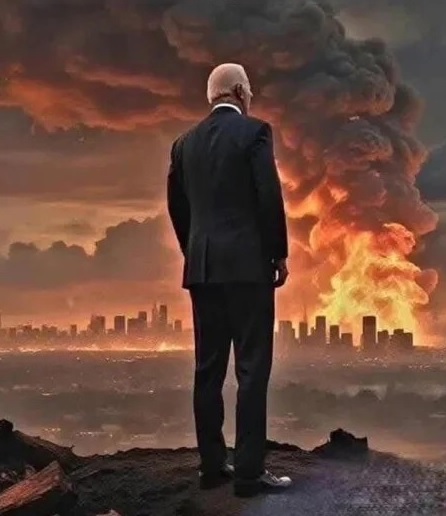 Photo: AP
Photo: AP
President Biden’s longtime aide rallied scores of nations to defend Ukraine, but then became a villain to the many critics of U.S. support for Israel’s war in Gaza, writes The New York Times in the article “How Antony Blinken, America’s Top Diplomat, Became the Secretary of War”.
Making his final trip as America’s top diplomat last week, Secretary of State Antony J. Blinken arrived in Paris, his former hometown, to a hero’s welcome.
It was a very different scene back in Washington a few days later, when Mr. Blinken gave a final speech before a crowd of foreign policy experts.
“Secretary Blinken! Your legacy will be genocide! You will forever be known as ‘Bloody Blinken, Secretary of Genocide,’” shouted a protester who had infiltrated the Atlantic Council event. Security officers led her out of the room, as well as a man waving a sign that read “Blinken: War Criminal.”
A similar drama punctured Mr. Blinken’s farewell news conference at the State Department two days later, as a journalist, shouting that Mr. Blinken belonged in The Hague, was carried from the room by security officers.
The contrasting scenes reveal the duality of Mr. Blinken’s tenure as secretary of state. Over four years and more than one million flight miles logged, Mr. Blinken was the face of America’s deep involvement in two wars, one in Ukraine and the other in Israel and Gaza. The first, the defense of Ukraine against Russia, was a popular cause marked by Ukrainian flags flying from American porches, and Mr. Blinken basked in accolades as he invoked the highest principles of international law and human rights.
But the war between Israel and Hamas in Gaza ignited by Palestinian terrorist attacks became a political and moral nightmare for the Biden administration as Israeli strikes with American-supplied weapons killed an estimated 46,000 Palestinians, many of them women and children.
While President Biden set the policy, Mr. Blinken, his decades-long aide and surrogate son, presented it to the public. The diplomat was accused of gutting the very principles he had championed in Ukraine, and became the target of vitriol rarely directed at a U.S. secretary of state.
 Blinken (in red circle), among President Obama's staff, watches the White House broadcast of the capture of Ben Landen in Pakistan by US special forces. May 2, 2011.
Blinken (in red circle), among President Obama's staff, watches the White House broadcast of the capture of Ben Landen in Pakistan by US special forces. May 2, 2011.
Photo: White House
So entwined are Mr. Blinken’s work and his reputation with conflict that he could just as easily be called by a retired cabinet title that is still on office plaques in the old State Department building — secretary of war.
War presented the Biden administration with the opportunity to forge closer international partnerships, and it is there that the president and his aides have excelled, Mr. Blinken said. “The United States is able to engage a more contested, a more complicated, a more combustible world from a position of strength,” he said. “That’s what I believe our legacy is.”
But the world served up an especially ugly parade of horrors as Mr. Blinken took charge of the State Department: strife and atrocities in Yemen, Syria, Haiti, Ethiopia, Armenia, Myanmar, the Democratic Republic of Congo and Sudan, where the secretary declared this month that combatants were carrying out a genocide.
Bearing a flawlessly polite and self-effacing demeanor, Mr. Blinken spent countless hours trying to resolve and prevent conflict. But for better or worse, his legacy rests not on forging grand peace treaties — those traditional diplomatic prizes eluded him — but on his role in two wars that often cast him in very different lights.
Mr. Blinken’s first test, the American withdrawal from Afghanistan, was widely seen as a fiasco.
The Taliban’s swift takeover of Kabul in August 2021 caught the State Department by surprise, forcing a chaotic evacuation of American citizens and Afghan allies. Some Republican lawmakers demanded that Mr. Blinken resign.
His moment came in February 2022. Mr. Blinken delivered a speech in Berlin invoking how Presidents John F. Kennedy and Ronald Reagan had stood up to Soviet power and declared that the United States would again defend “the governing principles of international peace and security.”
Mr. Blinken deployed his flawless French in Paris and Brussels, and cajoled leaders in Seoul and Tokyo. The result: a coalition of about 50 nations committed to supplying weapons to Ukraine or imposing economic sanctions on Russia.
As the war progressed, neither side sought negotiations, so Mr. Blinken was less a peacemaker than a war strategist. Immersed in details of military hardware and battlefield conditions, he often argued against more risk-averse Pentagon officials in favor of sending powerful American weapons to Ukraine.
And when the chairman of the Joint Chiefs of Staff, Mark A. Milley, suggested in late 2022 that Ukraine should capitalize on battlefield gains by seeking peace talks with Moscow, Mr. Blinken insisted the fight should go on.
 Blinken in Kyiv with shining Zelensky – the fight should go on!
Blinken in Kyiv with shining Zelensky – the fight should go on!
Photo: AP
Visiting Kyiv in May, Mr. Blinken, a guitar player, took the stage at a packed music club and led a local band in a rendition of Neil Young’s “Rockin’ in the Free World.” The defense of Ukraine had offered him a literal rock star moment.
Mr. Blinken would make a dozen wartime trips to the Middle East. They were grim affairs, in contrast to the European tours where he was hailed as a savior of Ukraine. Israeli officials complained about pressure from Washington on one day while Arab monarchs fumed on the next that Israel was out of control.
Again he immersed himself in military matters. Meeting with Israel’s war cabinet, he would study maps of Gaza and discuss details of strategy — though often with a critical eye, insisting that Israel do more to protect civilians. On one visit, they scrambled into a bunker when Tel Aviv came under rocket attack.
Over time, Mr. Blinken’s visits with Mr. Netanyahu seemed to become less and less effective. Sometimes the Israeli leader would publicly undermine his American guest’s positions hours after hosting him.
In keeping with Mr. Biden’s “bear hug” approach, Mr. Blinken and the State Department kept sending Israel weapons, including some 2,000-pound bombs that U.S. military officials call unsuited for urban combat.
Over the 16 months of war, Mr. Biden has approved $26 billion in aid to Israel. Mr. Blinken has never expressed regrets over refraining from using that leverage to influence Mr. Netanyahu. Signs of “daylight” between the United States and Israel only encouraged Hamas, he says.
State Department officials sent Mr. Blinken dissent cables opposing the policy. A handful resigned and became public dissidents.
“We don’t have a policy,” said Michael Casey, a diplomat and Iraq war veteran who resigned last year from his State Department post in Jerusalem, where he worked on Gaza. “We support the Israeli government’s goals over our own interests.”
He said that “of everyone in the cast of characters at the top, Antony Blinken has been the most disappointing.”
…In Washington they say ‘Biden himself did not make many decisions’. His employees did instead of the U.S. President.
So, Biden is watching the results of Blinken's foreign policy:
 Pic.: AI
Pic.: AI
read more in our Telegram-channel https://t.me/The_International_Affairs

 12:20 23.01.2025 •
12:20 23.01.2025 •






















